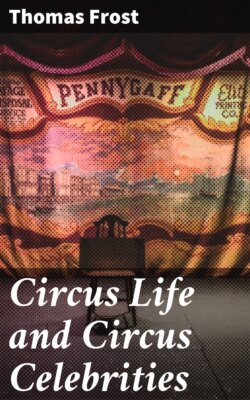Читать книгу Circus Life and Circus Celebrities - Frost Thomas - Страница 3
На сайте Литреса книга снята с продажи.
PREFACE.
ОглавлениеTable of Contents
There are probably few persons who do not number among the most pleasant recollections of their youth their first visit to a circus, whether their earliest sniff of the saw-dust was inhaled in the building made classical by Ducrow, or under the canvas canopy of Samwell or Clarke. In my boyish days, the cry of ‘This way for the riders!’ bawled from the stentorian vocal organs of the proprietor or ring-master of a travelling circus, never failed to attract all the boys, and no small proportion of the men and women, to the part of the fair from which it proceeded. Fairs have become things of the past within twelve or fifteen miles of the metropolis; but ever and anon a tenting circus pitches, for a day or two, in a meadow, and the performances prove as attractive as ever. The boys, who protest that they are better than a play,—the young women, who are delighted with the ‘loves of horses,’—the old gentlemen, who are never so pleased as when they are amusing their grandchildren,—the admirers of graceful horsemanship of all ages,—crowd the benches, and find the old tricks and the old ‘wheezes,’ as the poet found the view from Grongar Hill, ‘ever charming—ever new.’
What boy is there who, though he may have seen it before, does not follow with sparkling eyes the Pawnee Chief in his rapid career upon a bare-backed steed,—the lady in the scarlet habit and high hat, who leaps over hurdles,—the stout farmer who, while his horse bears him round the ring, divests himself of any number of coats and vests, until he finally appears in tights and trunks,—the juggler who plays at cup and ball, and tosses knives in an endless shower, as he is whirled round the arena? And which of us has not, in the days of our boyhood, fallen in love with the fascinating young lady in short skirts who leaps through ‘balloons’ and over banners? Even when we have attained man’s estate, and learned a wrinkle or two, we take our children to Astley’s or Hengler’s, and enjoy the time-honoured feats of equitation, the tumbling, the gymnastics, and the rope-dancing, as much as the boys and girls.
But of the circus artistes—the riders, the clowns, the acrobats, the gymnasts,—what do we know? How many are there, unconnected with the saw-dust, who can say that they have known a member of that strange race? Charles Dickens, who was perhaps as well acquainted with the physiology of the less known sections of society as any man of his day, whetted public curiosity by introducing his readers to the humours of Sleary’s circus; and the world wants to know more about the subject. When, it is asked, will another saw-dust artiste give us such an amusing book as Wallett presented the world with, in his autobiography? When are the reminiscences of the late Nelson Lee to be published? With the exception of the autobiography of Wallett, and a few passages in Elliston’s memoirs, the circus has hitherto been without any exponent whatever. Under the heading of ‘Amphitheatres,’ Watts’s Bibliotheca Britannica, that boon to literary readers at the British Museum in quest of information upon occult subjects, mentions only a collection of the bills of Astley’s from 1819 to 1845.
Circus proprietors are not, as a rule, so garrulous as poor old Sleary; they are specially reticent concerning their own antecedents, and the varied fortunes of their respective shows. To this cause must be ascribed whatever shortcomings may be found in the following pages in the matter of circus records. Circus men, too, are very apt to meet a hint that a few reminiscences of their lives and adventures would be acceptable with the reply of Canning’s needy knife-grinder,—‘Story! God bless you! I have none to tell, sir.’ There are exceptions, however, and as a rule the better educated members of the profession are the least unwilling to impart information concerning its history and mysteries to those outside of their circle. To the kindness and courtesy of several of these I am considerably indebted, and beg them to accept this public expression of my thanks.
T. FROST.
Long Ditton, Oct. 1st, 1873.
